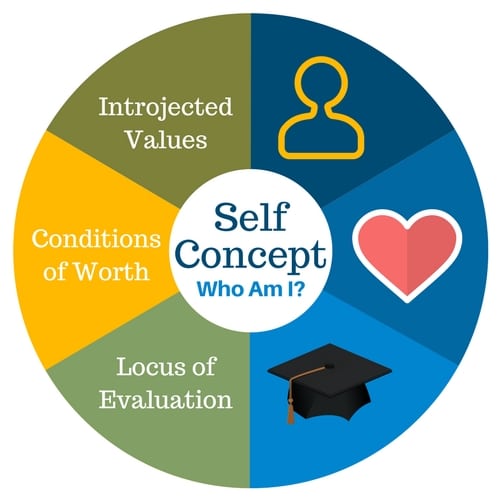Self Concept in Counselling
Self-concept is the ideas and beliefs that everyone holds about themselves.
This self-identity is made up of elements and influences throughout our lives.
We all create an image from our own subjective reality and it's made up of certain conditions that we hold as our truths.
Self-concept in counselling plays a big role as it is the picture of how a client views themselves.

The objectives of this article on self-concept are to:
- describe the meaning of self-concept related to counselling
- identify the importance of understanding your own self-concept as a counsellor
- recognize the importance of self-concept in the client's journey
Self Concept Examples
In the early development years, our self concept tends to be measured in terms of tangibles such as our eye color, height, what grade we are in school.
As we develop, so does our self concept. We begin adopting intrinsic or inner values as part of that self concept. For example, a junior school student may describe themselves as quite a shy individual.
Through the teen years and into adulthood, we add characteristics that we feel relation or affinity to, an example of which is a teenager choosing to refer to themselves as a goth. These choices are made and are added to the concept of self as we go through our lives.
The resulting incongruence between experience and self-concept leads to incongruence, which Rogers illustrated in 1957 using the following example, described by Tudor and Merry (2006: 72):
A mother ... becomes ill whenever her son makes plans to leave home; her need is to maintain her only source of satisfaction, but to admit this into awareness would be inconsistent with the picture she has of herself as a good mother; illness, however, is consistent with the self-concept so the experience is symbolised in this distorted fashion.
Self-Concept in Person-Centred Therapy
As a practitioner, we're advised to gain a personal understanding of our own self-concept in order to be fully with the client within their present moment.
We also need to study the theory of self-concept to understand the client's journey and identify where they feel that they may have lost their sense of self.
Now, if you ask someone who they are, it's likely that they may define themselves in terms of their gender, age, vocation, faith base, family position, culture or beliefs.
For example, I might say I'm a white middle-aged male working as a practising psychotherapist. I'm married, I have a child and in my spare time, I like going on the Internet.
Well, that's all good and well if I'm filling out a CV, but is it really a description of my true self-concept?
Key Concepts of Person-Centred Counselling
Faulty beliefs can start with what we call introjected values or values of others that are adopted by the person when they are a child.
In the below example, the client may have excelled at school, teachers may have told her she is a very high achiever, and this may have been reinforced by her parents praising her for getting such good grades.
She is taking the opinions of others and using them to value herself and this is called operating from an external locus of evaluation.
The result is an adoption of the truth "I am a high achiever and this is valuable". The teachers and the parents have created conditions of worth, meaning the child feels a sense of worth if certain conditions are met. In other words, I am worthy of praise and love when I achieve.
When the client is not able to cope, she feels a mismatch, or incongruence, of what she knows as her truth and that which she experiences in the here-and-now.
Not coping means I am worthless, based on my truths that I am worthy only when I am achieving.
The human condition of experiencing incongruence between the self concept and the here-and-now experience of the individual results in tension, possible confusion and maladjusted behaviours.
This is the result of being subject to conditions of worth and introjected values leading to functioning from an external locus of evaluation.
In counselling, we aim to empower the client to identify and possibly even break down the conditions of worth that have been adopted as truths.
This process enables the client to move from an external to an internal locus of evaluation.
Understandably this is a delicate process requiring patience and time from a caring practitioner who understands and recognises the importance of self concept, both on their own and in the client's journey.

In counselling, we aim to empower the client to identify and possibly even break down the conditions of worth that have been adopted as truths, enabling the client to move from an external to an internal locus of evaluation.
Free Handout Download
Self-Concept
Self Concept for the Counsellor
"We see the world not as it is, but as we are."
Covey (2004: 28)
The perceived truths that make up our concept of self define how we see the world.
Our concept of self has developed through experiences and interactions with others and it is the organized set of characteristics that we identify as being unique to us.
Any introjected values or conditions of worth that may lie unseen within us will distort how we view the world.
As reflective practitioners, we need to be aware that our own truths may well be flawed.
We need to be flexible and open to changing our self concept when new information comes into awareness. Being aware that we see the world not as it is but as we as individuals are, allows us to be more open to opinions and truths that challenge our own.
In short we would be able to value a client and their truths with unconditional positive regard.
Self Concept for a Client
A client entering counselling may hold truths as part of their self concept that are damaging, that are causing them pain.
An example may be a client who values themselves as quite a high achiever who has now found that they're in a situation within their own lives where they feel that they just can't cope at this present moment.
When this client checks their self concept, they find a truth that says that they are always able to achieve. When this is compared with the reality of not being able to cope, it creates a mismatch or an incongruence and the client feels psychological distress.
It's likely that these damaging beliefs will be invisible to the client, out of awareness, and so entwined into this self concept that if these truths were to be challenged, it's very likely that the client may even defend them.
Carl Rogers - Self Concept
Smith (2012: 207) observes the Rogerian view of Self-concept is an amalgam made up of diverse elements and our relationship with them:
The self-concept is a central aspect of the person-centred approach to counselling. It is basically how people define themselves, for example, 'I am caring, I am cheerful, I can sometimes be funny'. It is 'a fluid but consistent pattern of perceptions of the 'I' or 'me' in relation to the environment, personal values, goals and ideals' (Merry and Tudor 2006: 293). As well as a self as it exists in the present, people also have an 'ideal self' which is the self they ideally want to be. McLeod (2009) makes the interesting point that the self-concept might have been more accurately named the 'self process', as this term more precisely captures the fluid, ever-changing nature of the self as conceived by Carl Rogers.
Free Handout Download
Self-Concept
References
Covey, S. (2004). The 7 habits of highly effective people. London: Pocket Books
Smith, V. (2012). Key concepts in counselling and psychotherapy. Maidenhead: Open University Press
Tudor K & Merry T (2006) Dictionary of Person-Centred Psychology, PCCS Books
Page updated January 2021